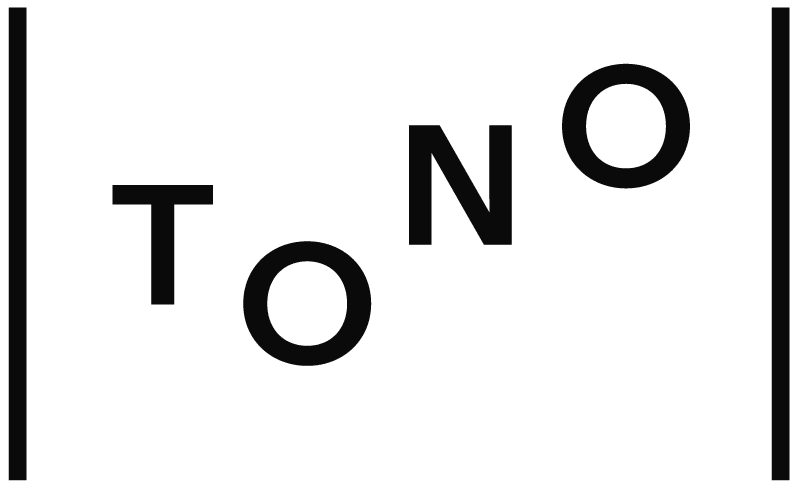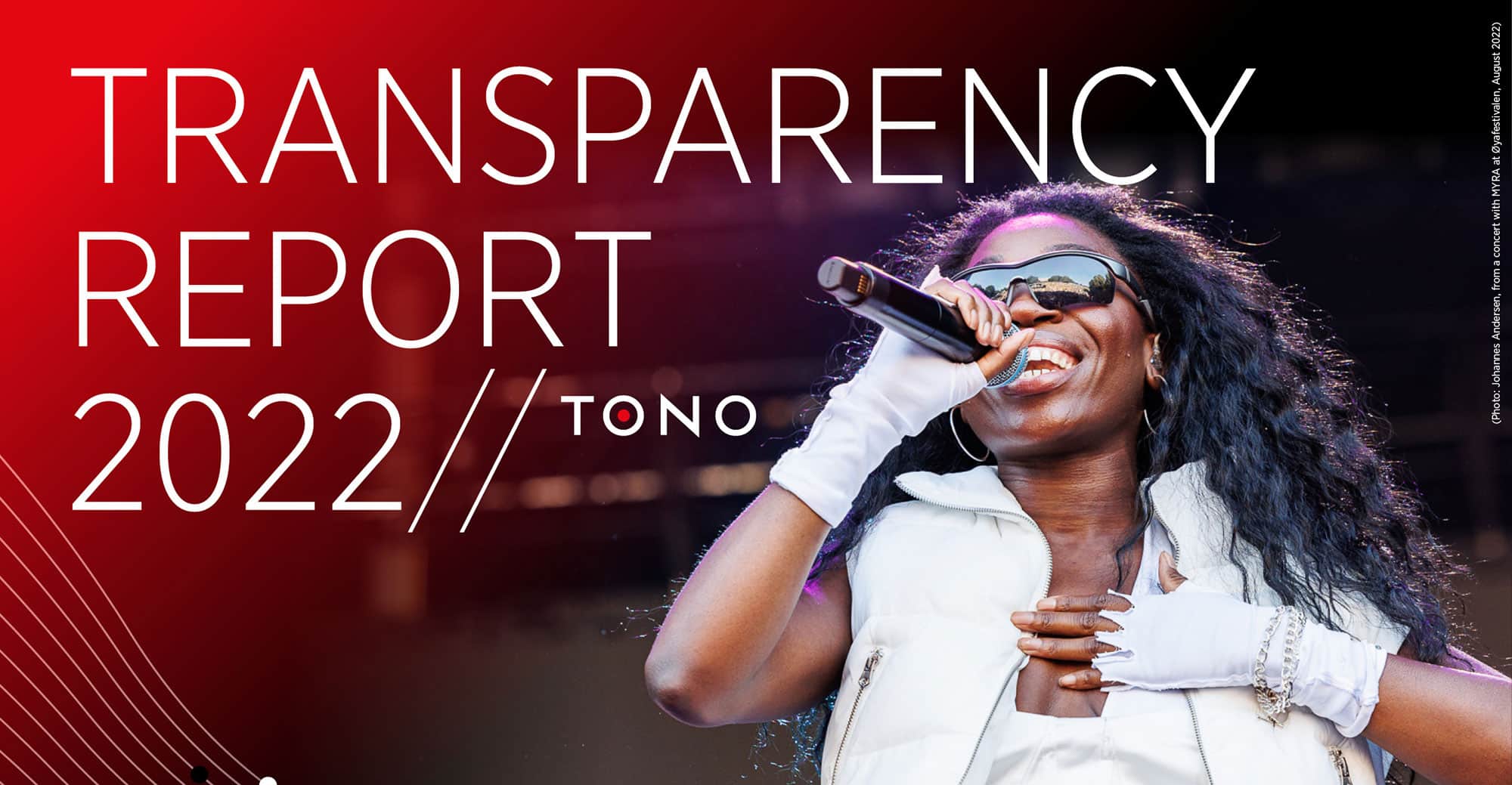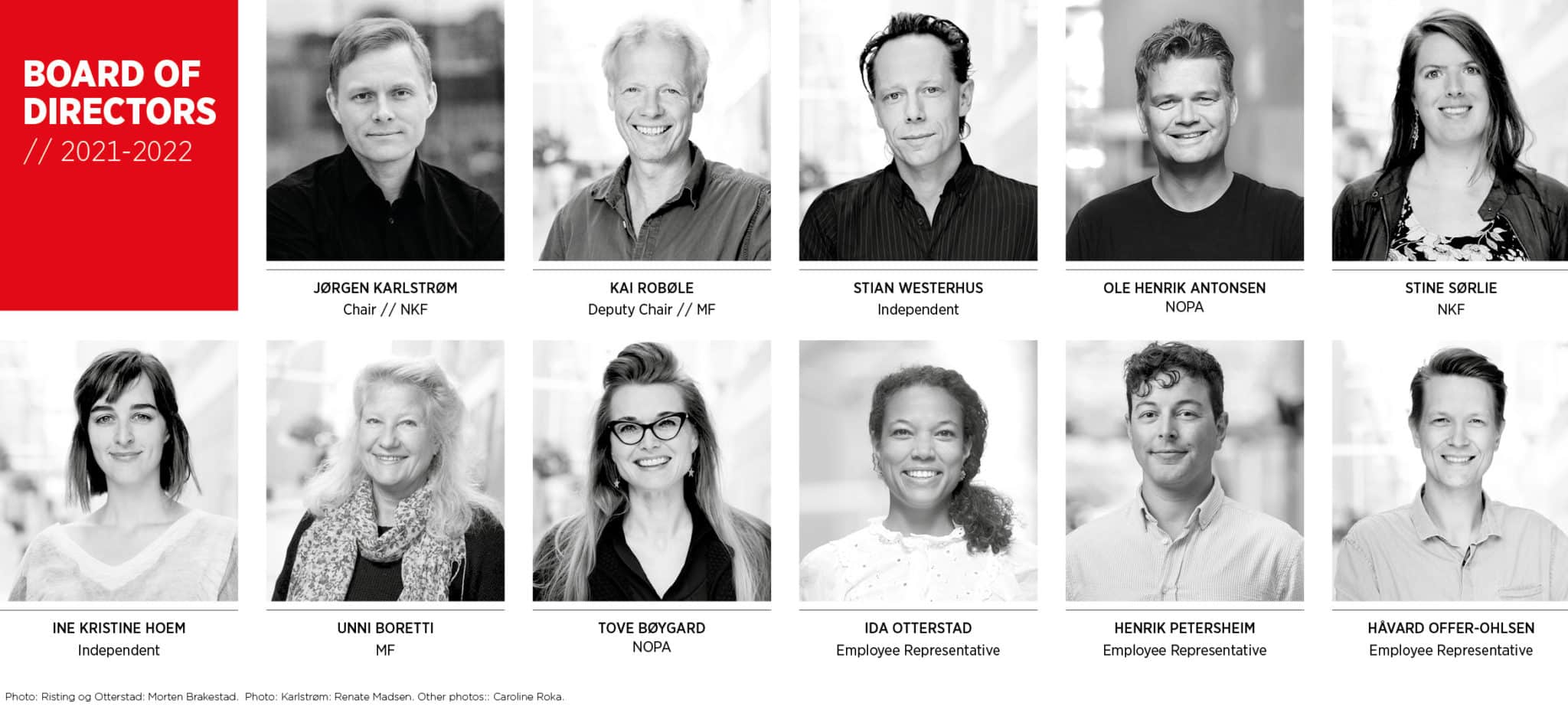


Current status and future development of the business
TONO SA (TONO) is a cooperative society that manages performing and recording rights relating to music. In addition to individual collection contracts with 39,060 rights holders, TONO has reciprocal representation agreements with 78 international sister companies, and thereby also manages their rights in Norwegian territory. TONO has delegated management of its rights holders’ recording rights to the Nordic Copyright Bureau (NCB) in Copenhagen, which is jointly owned by the Nordic collection companies Koda (Denmark), Stim (Sweden), STEF (Iceland), Teosto (Finland) and TONO.
TONO is operated from Oslo. Its office address is Møllergata 4, 0179 Oslo, Norway.
In 2022, the board of directors held nine meetings, while board committees held three meetings.
TONO has purchased directors and officers (D&O) liability insurance pursuant to Section 3-3a of the Norwegian Accounting Act. Coverage amounts to NOK 5 million.
Management contracts
As at 31 December 2022, TONO had management contracts with 39,060 rights holders. In 2022, 1,657 new rights holders were added, 13 of whom were music publishers.
By comparison, TONO had 37,439 rights holders as at 31 December 2021. In 2021, 1,549 new rights holders were added, 13 of whom were music publishers.
Women made up 21.8 per cent and men 78.2 per cent of the society’s individual members.
Music publishers made up 1.2 per cent of the membership.
Voting members
As at 31 December 2022, TONO had 1,965 voting members.
As at 31 December 2021, TONO had 1,917 voting members.
Women make up 16.6 per cent and men 83.4 per cent of the voting membership. Music publishers make up 1.1 per cent of the voting membership.
Financial performance
TONO generated gross revenues of NOK 864,624,850 in 2022. This is an increase of 2.45 per cent compared with 2021. After a 2 per cent deduction payable to the Norwegian Composers’ Fund, as well as losses and administrative costs, TONO had NOK 717,348,479 for distribution to rights holders, a decrease of 20,160,236 per cent compared with 2021. Expenses totalled 12.77 per cent of revenues in 2022, compared with 10.66 per cent the year before.
The financial statements have been prepared in accordance with the Norwegian Accounting Act of 1998, and comply with prevailing laws, regulations and generally accepted accounting practice. The Accounting Act of 1998 caused material changes in the way pension costs were recognised in 1999. As a result, TONO’s recognised equity is negative. The original effect of this was a liability in the amount of NOK -11,026,446. As at 31 December 2022, the total effect of liabilities recognised in equity came to NOK -8,176,241. The year before, the liability totalled NOK -11,741,423. The substantial change is attributable to the buyout of a pension scheme.
TONO’s distributable profit normally constitutes 85–90 per cent of its revenues. The distributable amount is whatever is left after all expenses have been deducted. The Board considers that TONO’s financial results for 2022 are good.
TONO has at all times a large and liquid cash management portfolio. The objective is to achieve the highest possible return on investment at the lowest possible risk. TONO’s conservative investment strategy secures stable returns. Each individual investment shall be made among those with the lowest risk in their asset class. Risk is further reduced through a broadly composed portfolio, and TONO employs multiple financial services providers to reduce the management risk.
Market developments
2022 was the year when the Covid-19 pandemic finally loosened its grip. Increased concert activity contributed to a strong growth in TONO’s concert-related revenues, which ended the year at NOK 104 million – the highest ever recorded for the concert segment. The background music segment also provided the highest ever revenues for TONO – NOK 2 million up on the pre-pandemic year 2019. Cinema revenues returned to a normal level. We saw underlying organic growth in the media segment (broadcasting and online transmission), but we must nevertheless recognise a slight downturn compared with the year before, when our 2021 income was boosted by several major settlements in arrears.
The Norwegian Collective Rights Management Act had an impact on TONO and our Articles of Association in 2022. TONO established rights categories, amended its collection contract and introduced new terms and conditions for concert organisers. In addition, we see that several aspects of the Collective Rights Management Act require judicial clarification. This means higher costs for TONO.
The music sector’s economic framework is constantly changing. Several of the trends we have seen in recent years continued in 2022. This includes direct licensing and the acquisition of rights. Technology continues to develop and 2022 was the year in which artificial intelligence made its definitive entry into the music field. TONO is closely monitoring this development and will address it in its forthcoming strategy discussions.
In October 2022, TONO entered into a partnership with the Irish company Spanish Point Technologies, a well-respected supplier of musical rights management systems. In the fourth quarter of 2022, TONO launched the wide-ranging technology programme Mjølnir, which became fully operational from the 1 January 2023. This substantial focus on technology has been requested by TONO’s AGM and will result in increased investments in administration in 2023 and 2024. However, it will pave the way for more modern and efficient operations and – in a technology-driven age – is necessary to enable TONO to perform its mission in accordance with Article 3(1) and 3(2)(a) of its Articles of Association.
TONO does not expect any particular changes in its rights portfolio in the current year.
NCB
NCB is an independent legal entity, which is led by a board elected by Koda, Teosto, Stim, STEF and TONO. NCB’s operations are performed by Koda. This has proved to be an efficient solution for NCB as an organisation, as well as its owners.
In 2022, NCB collected a total of DKK 95 million, compared with DKK 119.9 million in 2021. Revenues in 2022 were nevertheless higher than in 2020, when they totalled DKK 87 million. NCB’s operations in 2022 made a profit of DKK 13.047 million, compared with DKK 8.55 million in 2021. This has been transferred to equity, which totalled DKK 70.269 million as at 31 December 2022. Overall phonogram sales are declining in line with the increasing use of digital services, and NCB has adapted to the market situation, with a considerably reduced turnover.
TONO’s workforce
At the close of 2022, TONO had 64 permanent employees, three of whom worked part-time. At the close of 2021, TONO had 65 permanent employees, three of whom worked part-time.
TONO aims to have full equality between men and women. This means that there shall be no difference in the way men and women are treated with respect to salary, promotion and recruitment, for example.
TONO’s workforce comprises 35 women and 29 men. Two men and one woman are employed on a part-time basis. The average age of the entire workforce is 47 (46.0 years for women and 47.5 years for men).
The average gross monthly salary for all female employees at the close of 2022, including managers, came to NOK 58,631. The average gross monthly salary for male employees, including managers, came to NOK 71,122. The higher average salary for men is due to a higher proportion of men than women in management positions.
Internal control, HSE (health, safety and the environment)
The organisation’s HSE activities are systematised through the Works Committee (AMU). The Works Committee holds regular meetings.
Efforts relating to sickness absence shall be discussed at at least two meetings per year.
TONO had its own Inclusive Working Life (IA) agreement with the Norwegian Labour and Welfare Administration (NAV) for many years. The IA Agreement’s main objective was to foster the inclusion of everyone who is willing and able to work, either full time or part time. With effect from 2019, the IA Agreement has been extended to cover the entire labour market and is therefore no longer entered into with the individual enterprise.
In 2022, the sickness absence rate totalled 3.89 per cent, compared with 3.07 per cent the year before. Sickness absence is followed up in accordance with the IA Agreement and the provisions of the Norwegian Working Environment Act.
TONO does not engage in business activities that can pollute the external environment.
The employer’s duty to promote equality and prevent discrimination
TONO’s Code of Conduct, which all its employees have signed, contains the following provisions:
“TONO shall be a workplace with an inclusive working environment. Employees shall treat each other and those with whom they come into contact through their work with respect and integrity. TONO shall facilitate a working environment free from discrimination on the grounds of religion, skin colour, gender, sexual orientation, age, nationality or ethnic origin, or disability. TONO’s employees shall also contribute to a working environment free from bullying, abuse, harassment, etc. TONO will not tolerate any behaviour that may be perceived as degrading or threatening.”
Over time, it has been TONO’s goal to achieve a near equal distribution in the number of men and women in its workforce. As at 31 December 2022, women made up 55 per cent of its employees, while men made up 45 per cent. Men and women in comparable jobs receive the same salary.
Three employees work part-time at their own request, partly due to the need to provide care at home and partly due to reduced capacity for work.
Welfare and care leave is divided equally between the sexes, but there is a higher percentage of sickness absence among the women than the men.
TONO focuses on the issue of equality, and the statistics show that the Gender Equality Act’s requirements have been met.
TONO abides by the provisions of the Norwegian Cooperative Societies
Act with respect to board representation. These require that both genders shall have at least 40 per cent representation on TONO’s board of directors.
TONO’s 64 employees are an ethnically diverse group. We have employees from all the Scandinavian countries, from elsewhere in Europe, as well as Africa, Asia and the USA.
We are therefore of the opinion that TONO promotes equality in accordance with the purpose of the Act.
Fundamental human rights and decent working conditions
An account of TONO’s due diligence assessments pursuant to the Norwegian Transparency Act will be published on TONO’s website in June this year.
Oslo, 16 March 2023
